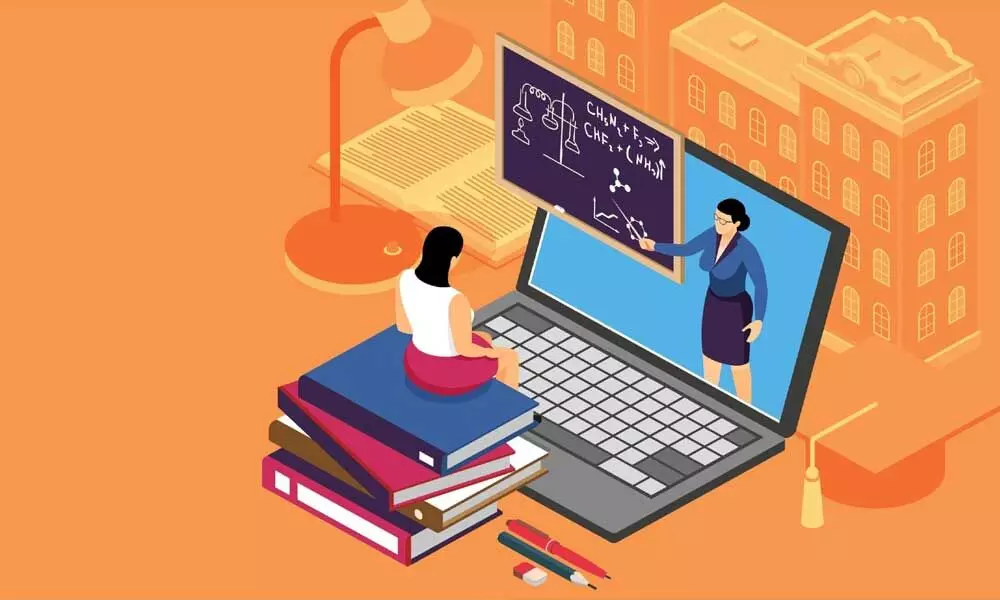Is online learning the future of education?
The future of e-learning appears bright, as students are getting used to it and parents are finding it easier and more convenient
image for illustrative purpose

In the midst of everyone hoping that school would start again, the variant 'Omicron' outbreak has forced our schools to close yet again. The students once again found themselves without classes again. Going to school and learning from teachers face-to-face, asking questions in person, being punctual, and receiving answers on time are all things students find to be lacking. Even so, students as a whole are keeping themselves engaged and motivated to perform well.
It is more common for teenage students to feel this way whether they live in large cities, smaller towns or in tier-2 cities. Some find going to school exasperating, while others attribute their frustration to the fact that their children are not vaccinated so far and the process of vaccination has begun only now.
In response to the outbreak of Covid-19, schools across the globe were closed. At present, approximately 1.2 billion children are not in school. Compared to traditional teaching methods, e-education and e-learning have flourished since then, primarily due to their digital and online characteristics.
Despite the quick shift away from classrooms, some worry that online learning won't succeed after the pandemic. In addition, they raise the question of how such a shift would affect the global education market in the long run. The future of e-learning appears bright, as students are getting used to it and parents are finding it easier and more convenient. Moreover, this offers multiple benefits, including improved productivity and a faster pace.
Technological advancements have paved the way for students to participate in lectures and classes virtually through videoconferencing. Furthermore, teachers can assess students' progress and communicate with them without worrying about spreading infections, so this seems like a win-win situation. Nonetheless, schools remain concerned.
As a result of virtual education, today's students have become accustomed to a comfortable way of studying. The rise of technology has also influenced the way teachers teach by chatting, video conferencing, and voting, in addition to distributing documents and even teachers feel that they have been able to communicate better with students during this pandemic. There is better understanding and harmony between teachers and students. In addition to highly individualized learning programs, online learning is also giving students the opportunity to explore real-life topics through hands-on activities and activities as well as comprehensive assessment procedures - both of which can be extremely beneficial to their academic progress. Students can learn independently before they enter college using e-learning platforms. Additionally, children from low-income communities will benefit since online education provides access to teachers, text books, and learning infrastructure. Furthermore, it will enable them to gain insight and experience outside of the classroom, thus broadening their perspectives. So, as opposed than discouraging students from taking online courses, it would be more appropriate to encourage them to do so.
Schools are devising new ways to make e learning more engaging
While schools are taking extra measures to keep the children motivated, there has been an increasing trend for them to incorporate and embed games during school lessons to improve engagement and Added elements of game playing to school lessons to make them more engaging, and efficient, for students. is the idea of applying game elements (for instance, scoring points, creating competitions, following rules) to a particular subject matter, in order to make it more interesting.
The power of technology in schools to achieve normalcy and bridge the learning gap has been well documented. The world is changing rapidly and there is a need for adaptive learning strategies.
Hurdles to overcome
In many countries and within income brackets, students struggle to access reliable internet connections and technology, which hinders their ability to learn digitally. Underprivileged children have different experiences than those from privileged backgrounds. Internet access and computer usage remain a dream for many deprived students. In addition, there are other concerns, such as e-learning technology, internet access, and child safety.
Students and teachers rarely interact and communicate even when technology is used. The lack of information stresses students. As part of their grooming program, schools provide structure, support, and rewards.
Traditionally, peer interaction is facilitated by a teacher and offers the benefit of person-to-person interaction. Similarly, these environments encourage the development of interpersonal skills such as setting boundaries, demonstrating empathy, and cooperating, as well as creating a safe environment where children can make friends. Moreover, it is more spontaneous than virtual learning.
Artificial environment - Institutions must make students interested in their subjects. That is impossible with virtual education. At home, the environment is not conducive to a young person's love of their principal discipline, since they don't feel it. No matter how well they learned the theory, they would not be interested in it. The education system would suffer because of this. The lack of interaction between students and professors does not alone contribute to a poor education. There is a lack of social activities for students and they have no chance to work on projects. Their motivation may be affected by the absence of their friends. When faced with a health crisis, it is appropriate to use virtual learning, but once the crisis is over, it is worthwhile to consider going back to the old education model. There will be serious consequences otherwise.
(The author is a technology expert, educator and Founder of LW Informatics)

